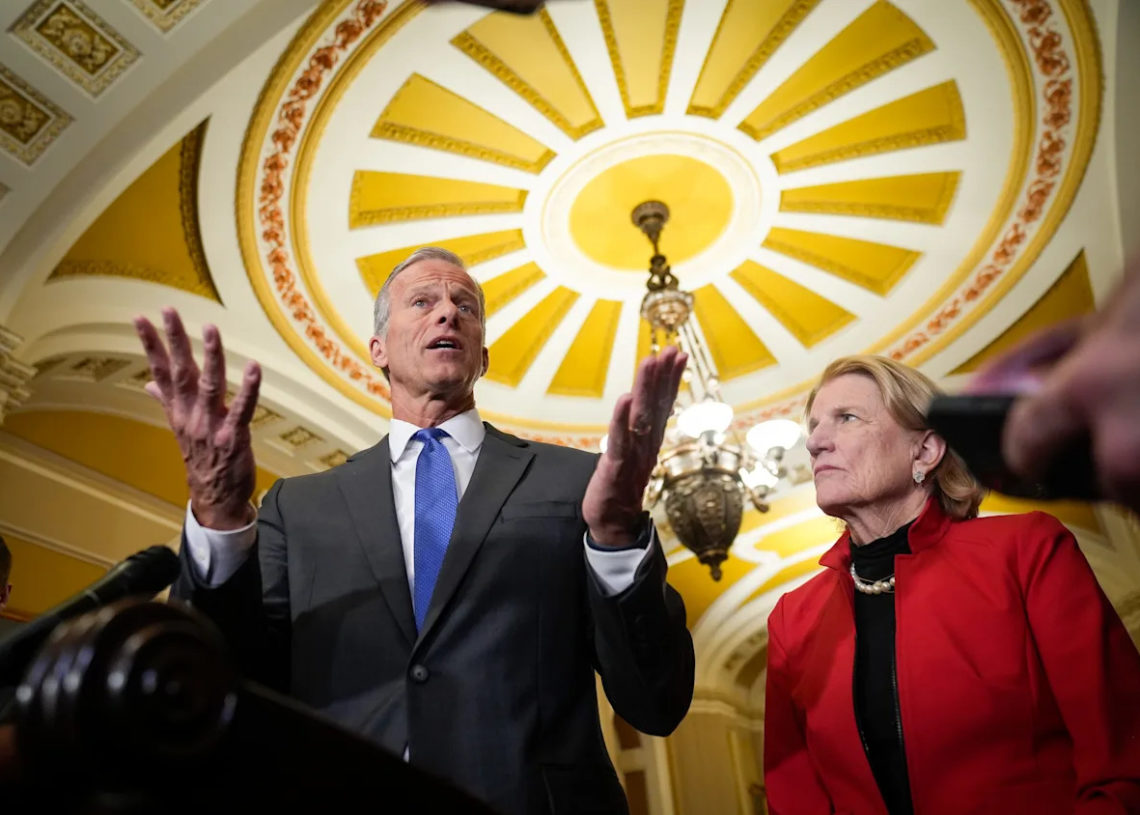WASHINGTON – The Senate begins its marathon debate about President Donald Trump’s package of legislative priorities as Republicans try to thread the needle for tax cuts, Medicaid reforms and border security funding with a narrow majority.
The debate comes after a dramatic 51-49 vote June 28 that was held open for more than three and a half hours while a handful of Republican senators negotiated with Senate leaders, Trump and Vice President JD Vance.
The victory meant the bill cleared a key hurdle for the success of Trump’s domestic agenda for tax cuts and border security. Trump has urged Congress to complete the measure by July 4.
After the vote, Minority Leader Chuck Schumer, D-New York, forced Senate clerks to read the entire 940-page bill rather than customarily waiving that chore.
The debate that could last 20 hours before senators begin voting on what is expected to be dozens of amendments in a process nicknamed a “vote-a-rama” that could hours longer.
Majority Leader John Thune, R-South Dakota, has said he is uncertain whether enough Republicans will support the final version of their bill to send it back to the House. Sens. Rand Paul of Kentucky and Thom Tillis of North Carolina were the only Republican votes against debating the bill as written.
“We’ll find out,” Thune said.
Here is what has happened so far:
What does Trump say about the Senate version of the bill?
The Trump administration “strongly supports” the Senate version of the bill, in a White House Office of Management and Budget statement June 28.The statement isn’t intended to favor the Senate version over the House version on any particular provision, but to signal Trump would sign it if approved by Congress. The two-page statement highlighted provisions for tax cuts, border security, energy and defense.
“President Trump is committed to keeping his promises, and failure to pass this bill would be the ultimate betrayal,” the statement said.
−Bart Jansen
What is a procedural vote?
You may have seen the Senate’s decision to begin their debate on the massive, Trump-backed legislation labeled a “procedural vote.” But what does that mean?
Not all votes in the House and Senate mean Congress is signing off on a bill and sending it to the president’s desk. Sometimes lawmakers simply vote to begin the process of considering legislation – or they vote on amendments, rules of debate and more.
Keep up with USA TODAY’s live coverage as we track the Senate’s path toward a final vote.
– Marina Pitofsky
Trump allies call for Senate parliamentarian to be removed. Who is Elizabeth MacDonough?
Republican are calling for the Senate’s parliamentarian to be fired after she ruled that several Medicaid provisions must be taken out of Trump’s tax, spending and policy bill, spelling trouble for the president and his party as they try to get the legislation signed into law by a self-imposed July 4 deadline.
The chamber’s leading rules expert, Elizabeth MacDonough, sided on June 26 against the inclusion of provisions that the GOP wanted to put in the bill aimed at reducing spending on Medicaid by requiring work from able-bodied adults and denying access to non-citizens.
That didn’t go over well with deficit hawks trying to secure for Trump his biggest legislative win of his second term.
For now, it appears MacDonough’s job is secure: Thune told reporters the GOP had no plans to overrule its parliamentarian, let alone fire her.
– Sudiksha Kochi
Which Republicans voted against Trump’s bill? The president blasts GOP lawmakers
Trump took to his Truth Social platform to criticize the GOP lawmakers who voted against moving his major tax bill forward – Tillis and Paul.
“Numerous people have come forward wanting to run in the Primary against “Senator Thom” Tillis. I will be meeting with them over the coming weeks, looking for someone who will properly represent the Great People of North Carolina and, so importantly, the United States of America,” Trump said.
Trump had a shorter message for Paul, a longtime GOP lawmaker from Kentucky: “Did Rand Paul Vote “NO” again tonight? What’s wrong with this guy???”
– Marina Pitofsky
GOP senators raise – and some resolve – concerns about bill
Why did Tillis and Paul refuse to back Trump’s bill? Paul, who golfed with Trump that afternoon, opposed the bill’s spending levels. Tillis voiced concerns about Medicaid cuts costing his state tens of billions of dollars.
Trump threatened to find a Republican primary opponent for Tillis in 2026.
Sen. Ron Johnson, R-Wisconsin, initially voted no on starting the debate. But he flipped his vote at the last minute rather than force a tie that Vice President JD Vance was on hand to break.
GOP Sens. Mike Lee of Utah, Cynthia Lummis of Wyoming and Rick Scott of Florida were the last to vote, each saying yes after hours of talks with leadership. Along the way, Lee withdrew a contentious provision that Sen. Tim Sheehy, R-Montana, threatened to oppose the legislation over.
− Bart Jansen
Elon Musk called bill ‘political suicide’ for hurting jobs, economy
Billionaire Elon Musk, Trump’s former adviser on cutting government spending, fired off another set of attacks against the president’s legislative package for potentially killing millions of jobs.
Musk had quieted his harsh criticism of Trump and the legislation the week after his departure from government May 30. But he blasted the bill again as the Senate prepared to debate it.
“The latest Senate draft bill will destroy millions of jobs in America and cause immense strategic harm to our country!” Musk said June 28 on social media. “Utterly insane and destructive. It gives handouts to industries of the past while severely damaging industries of the future.”
Musk added another post warning the GOP of the electoral risks if they vote for the Trump-backed legislation that is not polling well with Republicans.
−Bart Jansen
What’s in the Senate version of Trump’s bill? Does it include no tax on tips?
The largest provisions in the legislation would extend expiring tax cuts and create a few new ones, and a dramatic increasing in spending on border security.
The heart of the legislation would extend Trump’s 2017 tax cuts which are set to expire at end of the year. Republicans have said defeat of the measure would lead to a $4 trillion tax hike over the next decade.
New tax deductions Trump campaigned on would apply to tips for employees such as waiters through 2028 and for overtime pay. The Senate capped the deduction at $25,000 and weakened the break for individuals with income above $150,000.
For border security, the bill would increase funding about $150 billion for the Department of Homeland Security. The bill authorizes $45 billion for new detention centers as Trump ramps up arrests and $27 billion for a mass deportation campaign.
A crucial provision would increase the amount the country can borrow by $5 trillion. The country’s debt is already approaching $37 trillion and Treasury Secretary Scott Bessent has warned the current limit on borrowing will be reached in August.Sen. Rand Paul of Kentucky, a Republican holdout on the bill, said he wouldn’t vote for the bill unless the debt limit gets a separate vote. But Republican leaders want to keep the unpopular vote within the overall package.
−Bart Jansen
This article originally appeared on USA TODAY: Trump tax bill live updates: What happened in Senate vote last night?
The post Trump hits GOP senators who didn’t back his tax, Medicaid bill: Senate vote live updates appeared first on USA TODAY.



